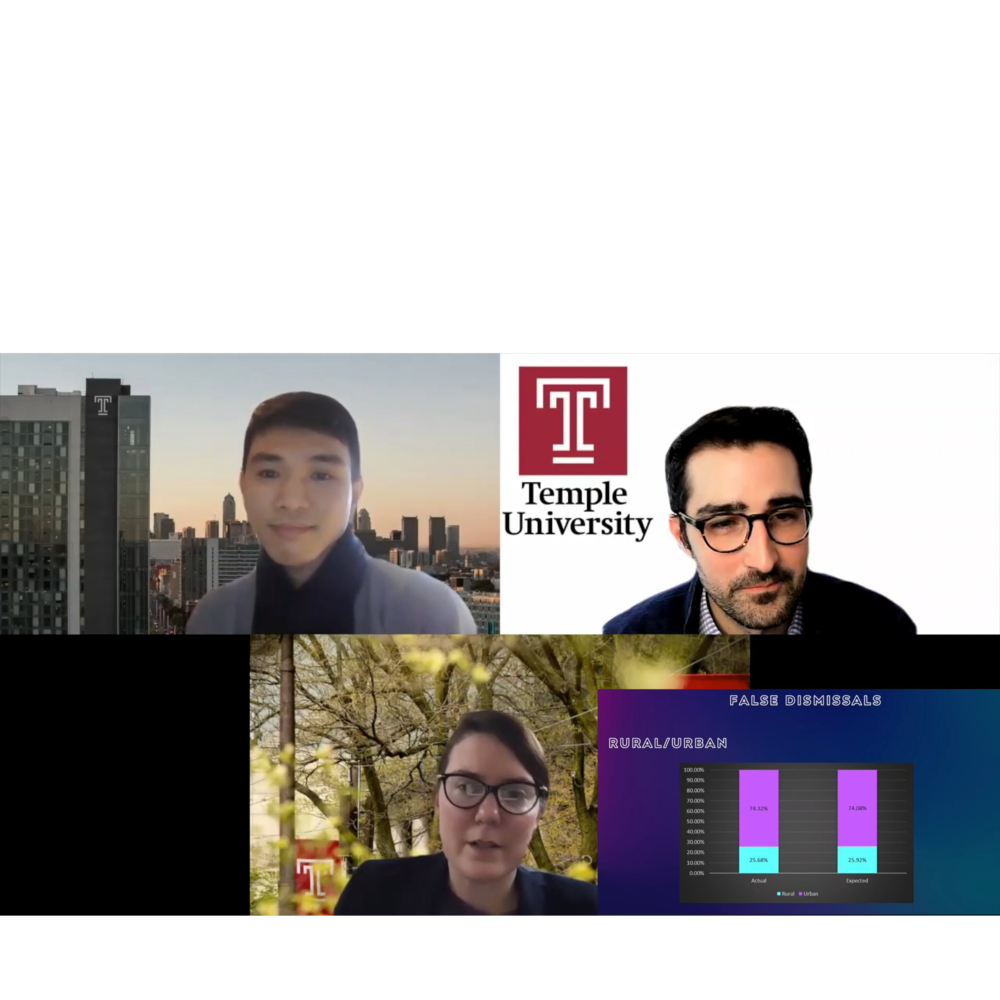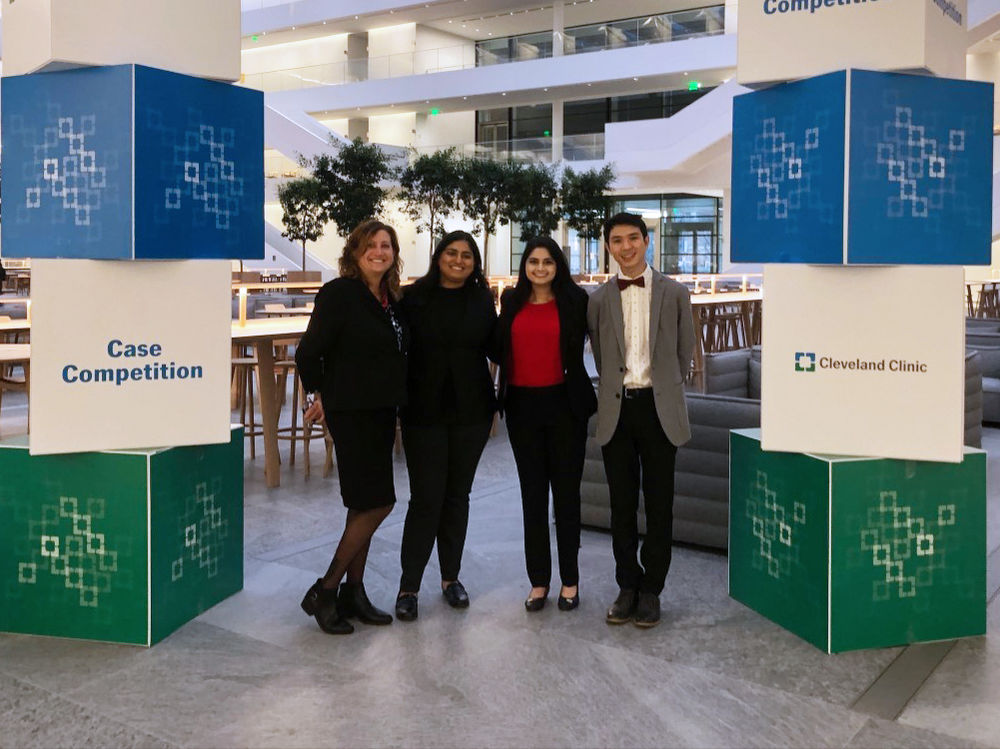Two College of Public Health graduate student teams won honors in recent national case competitions, contests that asked university teams from around the country to solve specific healthcare management challenges within a short period of time.
In February, a team of master of public health in health policy and management students won second place in the 3rd annual Big Data Health Science Case Competition, part of the University of South Carolina National Big Data Health Science Conference.
Competing separately in the 9th annual Cleveland Clinic Case Competition, another MPH team in January had its presentation place in the top 16 out of more than 80 teams nationwide, advancing in March to in-person championship rounds in Cleveland.

Clockwise from top-left: Hoa Vo, Josh Carleton, and Lynde Lutzow
Team DATAPO!NT
The Competition
2022 Big Data Health Science Case Competition, University of South Carolina
Friday, Feb. 4 - Sunday, Feb. 6 (virtual)
The team
MPH students Josh Carleton, Lynde Lutzow, and Hoa Vo. Faculty advisor: Bari Dzomba.
The challenge
On the first evening of the competition, teams received the challenge: use data analytics to solve the problem of “inappropriate hospitalizations.” That refers to “people being admitted for things that should be taken care of in the primary care setting, so they don’t overburden the hospital,” Carleton explains. By evening, teams were given access to five years of actual (de-identified) patient records from North Carolina hospitals. “It was 13 million lines of data,” explains Lutzow, who is a general surgery resident at Temple University Hospital and also pursuing her MPH in Health Policy and Management. They would need to present initial findings in less than 24 hours.
The work
Carleton, who professionally sets up health records software, imported the huge data set into his MySQL Workbench software, a lengthy process. “After an hour, it was at about five percent,” he recalls. Working with the data, the team had a eureka moment: the same codes were causing admissions every year. In particular, urinary tract infections were number one for every year.
“I think that’s what got our team into the second round,” says Vo, who like Carleton is pursuing a master of science in health informatics/master of public health dual degree. The team put together a PowerPoint presentation for Saturday morning and were one of the six teams chosen to advance to the final round, another red-eye overnight project: This time, they needed to analyze the data to find any trends in inappropriate dismissals, as well as bias there might be in inappropriate admissions and dismissals.
They found a pattern. Females showed a slightly higher percentage of false dismissals than expected, and patients’ county, age, gender and race all may play a part in false hospitalizations.
Carleton cranked through the data until 4 a.m. Sunday morning, the final day of the competition. Vo and Lutzow integrated the findings and put together the second presentation.
“They had to take turns sleeping,” Dzomba says.
The outcome
The team took home second place and a $3,000 prize.
“The fun part for me was to brainstorm with Josh and Hoa,” says Lutzow. “How could the hospital system use this, to use resources better?”
Adds Vo: “In public health we talk a lot about primary care and avoiding hospitalizations. It made us think through possible solutions in the electronic health records that could address it.”

Left to right: Adrienne Georgia-Haber, Sirisha Yadavalli, Maya Shenoy, and Hoa Vo
Team M.A.S.H.
The Competition
2022 Cleveland Clinic Case Competition Registration
Jan 27-31 (first round virtual), March 7-9 in Cleveland
The Team
MPH students Adrienne Georgia-Haber, Maya Shenoy, Hoa Vo, and Sirisha Yadavalli. Faculty Advisor: Elizabeth Van Nostrand. (“M.A.S.H.” is derived from the first letters of the student’s names.)
The challenge
Student teams received a formidable task that would challenge even a major consulting firm: “Develop a strategic plan to address primary care disrupters and propose a solution that positions Cleveland Clinic to be a market leader in growth, cost and quality.” The contest organizers wanted a market analysis of their competition and a plan to beat them.
The student team had formed and met before the challenge was released. They had faculty members advise them on presenting finances, because they likely would be competing against teams with master's of health administration and MBA students. They discussed approaches to finding data that they might require. They researched the Cleveland Clinic, its mission, and prior contests. Once the challenge was released, the students could no longer communicate with faculty or anyone in healthcare. They were on their own.
The work
The team had around four days to turn in an executive summary and PowerPoint presentation to explain their ideas.
“We needed to do a community needs assessment. What's in their market? Why did they ask these questions,” Vo says.
By Saturday they were pulling together data and outlining a plan. “We really shifted into overdrive on Sunday,” Shenoy says. “All the days before that we were gathering information, getting our plan together, getting our boxing gloves. On Sunday, it was like, let's get this done.”
They produced a two-page summary and 46-slide PowerPoint. It included ways that Cleveland Clinic might enhance its offerings with a focus on its agile staffing, community engagement, and easier access for patients, including an interactive voice app named “Hey Cleveland!” that could answer questions for patients and direct them toward appropriate care. The presentation included budgets for proposed initiatives.
The outcome
In February, the CPH students learned that they were selected into the final 16 and would travel to Cleveland for the championship rounds. Faculty advisor Van Nostrand arranged sessions with faculty members who asked pointed questions, as the live judges in Cleveland might, and critiqued the content and presentation. Bringing enhanced materials to Cleveland, they made a 15-minute presentation to contest judges. Ultimately, the team didn’t advance further in the contest.
“It was really interesting to see how all the teams went about solving the problems, especially during the final presentations,” Yadavalli says.
“We were on the right track from a patient care perspective. When you looked at the final presentations, a lot of their ideas overlapped with ours,“ says Georgia-Haber. “But it was very business-forward. As MPH students, we’re less focused on business perspectives than other teams that had health administration and MBA students.”
In the end, the competition was a learning experience for the students, and it helped raise the exposure of the program.
“It was a great opportunity,” Vo says. “Meeting people from all over the country and letting them know about Temple.”
